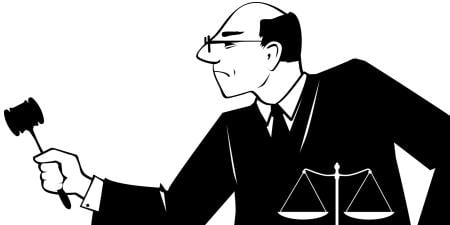In 1992 an Ohio physician failed to file one of his employee’s quarterly federal tax returns (a misdemeanor); in 1995 he failed to pay estimated taxes of about $160,000 (a felony). This occurred during a time when he was managing his own business affairs. In 1998 he pled guilty in federal court and paid, in addition to restitution, a $2,000 fine and served 6 months of monitored home confinement. In 2000, the Ohio board of licensure suspended his license for 90 days based on the interpretation of the law that the misdemeanor crime involved “moral turpitude.”
The physician took the medical board to court, but the court affirmed the board’s license suspension. Immediately, the physician appealed the trial court’s decision, and, in 2002, an Ohio court of appeals reversed the trial court’s decision, stating, “We believe appellant’s misdemeanor offense under the circumstances of the present case did not rise to the level of baseness, vileness, or the depravity in private and social duties which man owes to his fellow man, or to society in general” [1]. The appeals court asked the licensing board to review the case again based upon only the felony, and the board reaffirmed the suspension, which was subsequently upheld by the Ohio Supreme court in 1994.
This case asks whether a doctor’s behavior outside the professional arena should be considered by a regulatory authority as a factor in deciding the doctor’s fitness to practice. There is general agreement that competence and behavior occurring within the practice of medicine are proper criteria to consider.
Seemingly similar questions have been asked about other endeavors. Can a bad person be a good artist, actor, and so on? Should we exhibit Picasso’s paintings of women even if he is known to have treated them badly? Should we listen to or perform the music of Richard Wagner, knowing he was an outspoken anti-Semite? These questions may seem analogous but they are not. In these examples we may choose to admire and enjoy the creations of the artists and simultaneously dislike the artist as a person. When encountering the art (visual, aural, or performance) we need not and actually often do not interact personally with the artist. We are experiencing and evaluating the artistic product, not the artist, and, significantly, we do not consider the transgressions of one artist a reflection on the total universe of artists.
Doctors are different. Patients almost always interact personally with their doctors (only a few specialties such as radiology and pathology have little direct patient contact). Patients do not interact with the products produced by doctors; the patient-doctor relationship is the product.
The unwritten social contract doctors have with patients is based on trust. Each patient trusts that his doctor will act only in his or her best interests. Trust in medical institutions is generated by extension of the trust one has in one’s individual physicians and by the reputation of the institution itself. In many circumstances the patient does not choose the specific doctor and, even if he or she does choose, there may be little objective basis for that choice. Rather, patients “trust” that their welfare and best interests will be the paramount factors in the decisions made by the medical system and the doctors who treat them. The loss of trust in doctors, individually and collectively, is a patient safety issue. Without trust, persons in need of care will not be forthcoming with accurate health information, are unlikely to be compliant with medical treatments, and in some cases may not utilize the health care system at all.
So it is important to consider the effect of aberrant extraprofessional behavior on the trust the patient has in her personal doctor and consequently in the profession as a whole. We must also question whether the identified behavior puts patient safety at risk.
Social policy as expressed in U.S. law designates “moral turpitude” as a valid reason to restrict the licensing of professionals, including but not limited to, doctors and lawyers, and also as a criterion for admission to the U.S. (as a visitor or immigrant). Moral turpitude is defined by state law and specifically in our index case as: “an act (of) baseness, vileness, or the depravity contrary to accepted and customary rule of right and duty between human beings” [1]. Other states have definitions very much the same. The societal view of what constitutes such behavior has varied over time; note, for example, the changing view of behaviors associated with same-sex romantic relationships.
The Federation of State Licensing Boards, in its model legislation for state medical license boards, lists many grounds for sanctioning medical licenses including “the commission or conviction of a misdemeanor involving moral turpitude or a felony, whether or not related to the practice of medicine, or the entry of a guilty, nolo contendere plea, or deferred adjudication (without expungement) to a misdemeanor involving moral turpitude or a felony charge” [2]. The U.S. State Department, however, lists a number of specific crimes as examples of moral turpitude. The list includes “tax evasion (willful),” “an intent to defraud,” and “fraud against revenue or other government functions” [3].
A law enacted in Illinois in 2011 mandates permanent revocation without a hearing of the license of a health care worker convicted of forcible felony or criminal battery against a patient “including any offense based on sexual conduct or sexual penetration” or one who is required to register as a sex offender [4]. No discretion to the board is allowed.
It seems highly likely that a search of state laws would confirm that the right of a medical licensing board to restrict a doctor’s license for behavior involving moral turpitude is either enshrined in law or accepted in practice. It is critical to note that any felony or a misdemeanor involving moral turpitude may be the offense.
We depend on the criminal justice system to punish illegal behavior and deter others from committing it, both by preventing the perpetrator from continuing bad behavior and by meting out retribution for what has already been done. The license to practice medicine is granted to ensure competency and protect patient safety. Ideally, restriction of the license should be invoked only for reasons related to competence and patient safety and not used as a punishment per se. As a matter of policy, however, it is clear that the connection between “moral turpitude” outside the practice of medicine and the ability to practice medicine safely has been accepted as social policy.
This connection was clearly stated in 1956 by the attorney general in the state of Washington in an advisory opinion as follows:
“Has a person who is licensed to practice medicine and surgery in the state of Washington, and who has been convicted in a Federal court of the offense of income tax evasion, been convicted of a crime involving moral turpitude as defined in our statute, RCW 18.72.030 (1)?”
Our answer is in the affirmative [5].
Why this is so and whether it is true in all cases is worth discussing. We can consider four qualities or types of behavior to illuminate the question.
Honesty. Patients assume that doctors are honest, that they will not misrepresent findings or diagnoses during the course of the patient-doctor relationship. Patients assume that their doctors will honestly recognize and deal with conflicts of interest. Not only do patients make this assumption, but this principle is also a basic ethical imperative. It is explicitly stated as one of the nine AMA Principles of Medical Ethics [6]. Patients trust the entire universe of doctors to adhere to this standard. Dishonesty in the context of medical treatment is an obvious breach of professionalism.
It is likewise reasonable to believe that dishonesty outside the professional arena may extend into the doctor’s dealings with patients. Why should a doctor who lies about his income tax, an action that has well known and predictable consequences, not behave dishonestly in the medical sphere, an area over which he exerts far more control and in which the consequences, if any, are less predictable and likely to be less consequential? A pattern of dishonesty in any area of a doctor’s life may be damaging to patient trust in the doctor and by extension in the profession and detrimental to the best interests and safety of that doctor’s patients.
Criminal behavior. Conviction of a crime generally has a pejorative influence on one’s reputation. Public trust in the convicted doctor and the entire profession is eroded. Should a doctor convicted of a crime outside the medical arena have restrictions (temporary or permanent) imposed on his or her practice of medicine? The licensing board restricts practice to protect patients. The licensing board should not mete out retribution, as the state does; it should strive to protect patients by preventing further criminal behavior that affects competence or patient safety. If the licensing authority has reason to believe that the commission of a crime or the presence of “moral turpitude,” however defined, may affect competency or safety, then restriction of practice is justified.
Health. It is the responsibility of each doctor to be physically and emotionally healthy so his or her function is not impaired while treating patients. In considering the case of the Ohio physician, one could ask the question: Did an underlying illness contribute to the dishonest behavior? Does the doctor have bipolar disorder and did he in a manic phase accumulate debt and imperil his financial status? Was his judgment about cheating on his tax return influenced by an illness such as depression or addiction? The doctor must pay the legal penalty for breaking the law, as must any person. As a part of its deliberations about the restriction of privileges to practice, the licensure board should consider referring the doctor for medical and psychiatric evaluation. The finding of a treatable illness should be a factor in the decision of the licensure board. The best resource for this is a physician health program (PHP). Most states have such programs associated to different degrees with local licensure boards and state medical societies [7].
Boundary violations with patients. Patients trust that information and the access to physical and the emotional closeness granted to doctors in the course of the patient-physician relationship will be used only for therapeutic purposes. The use of such information or access to satisfy the physical or emotional needs of the doctor constitutes a boundary violation. It is important to emphasize that the responsibility for understanding and enforcing this obligation rests 100 percent with the doctor. The universally accepted prohibition against a sexual relationship with a patient dates back to the time of Hippocrates. Criminal sexual behavior outside the medical arena (e.g., exhibitionism, child pornography, rape) may be especially destructive of the trust patients have in the doctor and the profession We must also ask whether these behaviors outside the professional arena put patients at risk of boundary violations. Criminal behaviors involving sexual boundaries occurring outside the practice environment may be indicators of a risk for such behaviors to occur in the professional sphere and thus constitute a risk to patients whether or not the patients are aware of these behaviors.
The American Medical Association’s Code of Medical Ethics is the generally accepted standard of professional behavior. In addition to the AMA ethics code, medical professional organizations, medical staffs, and institutions frequently have their own codes and standards of behavior. Professional organizations and institutions should evaluate members’ behavior in accordance with these established ethical standards and take action about membership and clinical privileges to protect patients and enhance trust in the profession. Ultimately it is the responsibility of the state licensing board to protect the public by adjudicating individual cases, taking into account any possible underlying illness, utilizing appropriate due process, and relying on review by the court as allowed by law.
We can conclude that, to the extent that morally intolerable or illegal behavior outside the medical arena is construed as posing a danger to patients due either to the specific behavior or potential loss of trust in the doctor or the entire profession, regulatory or judicial sanctions on the practice of medicine are appropriate. This conclusion is supported both by our ethical imperatives and by our legal system.
References
-
Rossiter v State Med Board of Ohio. 155 Ohio App 3d 689, 802 NE2d 1149 (Ohio St Ct App 2004). http://caselaw.findlaw.com/oh-court-of-appeals/1248179.html. Accessed September 16, 2011.
-
Federation of State Medical Boards. Essentials of a Modern Medical and Osteopathic Practice Act. 12th ed. http://www.fsmb.org/pdf/GRPOL_essentials.pdf: 16. Accessed September 5, 2011.
-
US Department of State. 9 FAM 40.21(a) N2.3-2 Crimes Committed Against Governmental Authority. Foreign Affairs Manual—Volume 9: Visas. http://www.state.gov/documents/organization/86942.pdf. Accessed September 5, 2001.
-
Illinois Public Act 097-0156 (2011). Section 2105-165: Health worker licensure actions; sex crimes. http://www.ilga.gov/legislation/publicacts/fulltext.asp?Name=097-0156&GA=97. Accessed September 16, 2011.
-
Washington State Office of the Attorney General. AGO 1956 No. 291 Physicians and surgeons—revocation of license. http://www.atg.wa.gov/AGOOpinions/opinion.aspx?section=topic&id=10454. Accessed September 5, 2011.
-
American Medical Association. Principles of Medical Ethics. http://www.ama-assn.org/ama/pub/physician-resources/medical-ethics/code-medical-ethics/principles-medical-ethics.page. Accessed September 2, 2011.
-
A current listing of PHPs may be found at: Federation of State Physician Health Programs. State program listing. http://www.fsphp.org/State_Programs.html. Accessed September 16, 2011. If there is no local PHP, the national organization can help find an evaluation resource.



